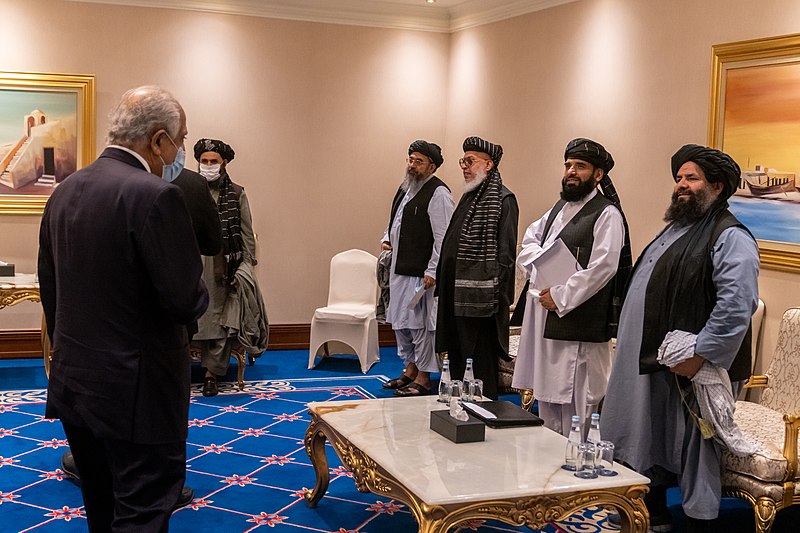Since taking over Afghanistan in August of 2021, the Taliban has enacted restrictions mostly against women and girls. Members of the insurgent group recently tried to crack down on a protest for women’s rights by spraying demonstrators with pepper spray.
The Guardian reports that the Taliban forces sprayed pepper spray on a group of women who were protesting for women’s rights and education in the capital of Kabul. Around 20 women gathered in front of Kabul University over the weekend, demanding “equality and justice” with banners that also said “women’s rights, human rights.” Members of the insurgent group later broke up the protests as they arrived in several vehicles.
“When we were near Kabul University three Taliban vehicles came, and fighters from one of the vehicles used pepper spray on us,” recalled one woman to AFP. “My right eye started to burn. I told one of them, ‘Shame on you,’ and he pointed his gun at me.”
Two other demonstrators recalled that one of the women had to be brought to the hospital following an allergic reaction to the pepper spray aimed at them. A correspondent for AFP also saw one Taliban member confiscate the mobile phone of a man who was filming the protests.
The Taliban has banned unauthorized protests and has used force to intervene in demonstrations demanding equal rights for women and girls. Taliban authorities have also barred female public sector employees from returning to work and many secondary schools in Afghanistan have not been opened for girls as well as public universities remaining closed. The insurgent group has also banned long-distance trips for women unless accompanied by a close male relative.
In other related news, western Afghanistan was recently hit by an earthquake, leaving at least 26 people who died when their homes collapsed on them in the Qadis district in the western province of Badghis. The US Geological Survey said that the earthquake had a magnitude of 5.3 on the scale. Aside from 26 fatalities, four more people were injured from the calamity.
Badghis province spokesman Baz Mohammad Sarwary said that the number of casualties may increase, noting that the province is mountainous and is one of the most poverty-stricken regions in Afghanistan.



 Trump Congratulates Japan’s First Female Prime Minister Sanae Takaichi After Historic Election Victory
Trump Congratulates Japan’s First Female Prime Minister Sanae Takaichi After Historic Election Victory  Trump Slams Super Bowl Halftime Show Featuring Bad Bunny
Trump Slams Super Bowl Halftime Show Featuring Bad Bunny  China Overturns Death Sentence of Canadian Robert Schellenberg, Signaling Thaw in Canada-China Relations
China Overturns Death Sentence of Canadian Robert Schellenberg, Signaling Thaw in Canada-China Relations  India–U.S. Interim Trade Pact Cuts Auto Tariffs but Leaves Tesla Out
India–U.S. Interim Trade Pact Cuts Auto Tariffs but Leaves Tesla Out  Trump’s Inflation Claims Clash With Voters’ Cost-of-Living Reality
Trump’s Inflation Claims Clash With Voters’ Cost-of-Living Reality  Japan’s Prime Minister Sanae Takaichi Secures Historic Election Win, Shaking Markets and Regional Politics
Japan’s Prime Minister Sanae Takaichi Secures Historic Election Win, Shaking Markets and Regional Politics  Trump Allows Commercial Fishing in Protected New England Waters
Trump Allows Commercial Fishing in Protected New England Waters  US Pushes Ukraine-Russia Peace Talks Before Summer Amid Escalating Attacks
US Pushes Ukraine-Russia Peace Talks Before Summer Amid Escalating Attacks  Netanyahu to Meet Trump in Washington as Iran Nuclear Talks Intensify
Netanyahu to Meet Trump in Washington as Iran Nuclear Talks Intensify  Taiwan Says Moving 40% of Semiconductor Production to the U.S. Is Impossible
Taiwan Says Moving 40% of Semiconductor Production to the U.S. Is Impossible  Bangladesh Election 2026: A Turning Point After Years of Political Suppression
Bangladesh Election 2026: A Turning Point After Years of Political Suppression  Bosnian Serb Presidential Rerun Confirms Victory for Dodik Ally Amid Allegations of Irregularities
Bosnian Serb Presidential Rerun Confirms Victory for Dodik Ally Amid Allegations of Irregularities  China Warns US Arms Sales to Taiwan Could Disrupt Trump’s Planned Visit
China Warns US Arms Sales to Taiwan Could Disrupt Trump’s Planned Visit  Trump Says “Very Good Talks” Underway on Russia-Ukraine War as Peace Efforts Continue
Trump Says “Very Good Talks” Underway on Russia-Ukraine War as Peace Efforts Continue  Ghislaine Maxwell to Invoke Fifth Amendment at House Oversight Committee Deposition
Ghislaine Maxwell to Invoke Fifth Amendment at House Oversight Committee Deposition  Anutin’s Bhumjaithai Party Wins Thai Election, Signals Shift Toward Political Stability
Anutin’s Bhumjaithai Party Wins Thai Election, Signals Shift Toward Political Stability 































